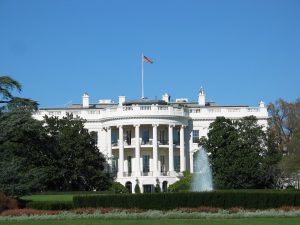Protests have erupted over some of President Donald Trump’s immigration orders and policies.  Candidate Trump and President Trump is correct that he has brought immigration issues to the forefront in American politics.
Candidate Trump and President Trump is correct that he has brought immigration issues to the forefront in American politics.
In January, 2017 President Trump signed an Executive Order called “Enhancing Public Safety in the Interior of the United States”, which, the Order states, was signed pursuant to the President’s authority under the Immigration and Nationality Act (INA) (8 U.S.C. 1101 et seq.), “and in order to ensure the public safety of the American people in communities across the United States as well as to ensure that our Nation’s immigration laws are faithfully executed.” The Executive Order states that its purpose is to address the issue of “Many aliens who illegally enter the United States and those who overstay or otherwise violate the terms of their visas present a significant threat to national security and public safety. This is particularly so for aliens who engage in criminal conduct in the United States.” Furthermore, the Order states that “Sanctuary jurisdictions across the United States willfully violate Federal law in an attempt to shield aliens from removal from the United States. These jurisdictions have caused immeasurable harm to the American people and to the very fabric of our Republic.” Moreover, “Although Federal immigration law provides a framework for Federal-State partnerships in enforcing our immigration laws to ensure the removal of aliens who have no right to be in the United States, the Federal Government has failed to discharge this basic sovereign responsibility. We cannot faithfully execute the immigration laws of the United States if we exempt classes or categories of removable aliens from potential enforcement. The purpose of this order is to direct executive departments and agencies (agencies) to employ all lawful means to enforce the immigration laws of the United States.”
Hence, the Executive Order mandates that “In executing faithfully the immigration laws of the United States, the Secretary of Homeland Security (Secretary) shall prioritize for removal those aliens described by the Congress in sections 212(a)(2), (a)(3), and (a)(6)(C), 235, and 237(a)(2) and (4) of the INA (8 U.S.C. 1182(a)(2), (a)(3), and (a)(6)(C), 1225, and 1227(a)(2) and (4)), as well as removable aliens who:
“(a) Have been convicted of any criminal offense;
(b) Have been charged with any criminal offense, where such charge has not been resolved;
(c) Have committed acts that constitute a chargeable criminal offense;
(d) Have engaged in fraud or willful misrepresentation in connection with any official matter or application before a governmental agency;
(e) Have abused any program related to receipt of public benefits;
(f) Are subject to a final order of removal, but who have not complied with their legal obligation to depart the United States; or
(g) In the judgment of an immigration officer, otherwise pose a risk to public safety or national security.” (Emphasis added)
The Order states that “It is the policy of the executive branch to empower State and local law enforcement agencies across the country to perform the functions of an immigration officer in the interior of the United States to the maximum extent permitted by law”.
This Executive Order’s stated design is to remove undocumented immigrants who are dangerous  criminals and/or pose a threat to society. In its present state, it has a fairly broad definition of what an offense would be such that an undocumented immigrant would be removed. It includes the possibility of deportation where someone is not convicted but only charged with a crime. It includes deportation for being charged with any kind of crime, even potentially minor non-dangerous crimes. It further includes the potential for deportation when a person has not been charged or convicted of a crime but merely suspect of a crime in the individual judgment of an immigration officer. Technically, merely being an undocumented immigrant is a crime which alone could result in deportation. And the Order empowers not just federal immigration officers, but local law enforcement offers to enforce the order, turning them into de facto immigration officers. Consequently, this Executive Order is not without controversy.
criminals and/or pose a threat to society. In its present state, it has a fairly broad definition of what an offense would be such that an undocumented immigrant would be removed. It includes the possibility of deportation where someone is not convicted but only charged with a crime. It includes deportation for being charged with any kind of crime, even potentially minor non-dangerous crimes. It further includes the potential for deportation when a person has not been charged or convicted of a crime but merely suspect of a crime in the individual judgment of an immigration officer. Technically, merely being an undocumented immigrant is a crime which alone could result in deportation. And the Order empowers not just federal immigration officers, but local law enforcement offers to enforce the order, turning them into de facto immigration officers. Consequently, this Executive Order is not without controversy.
Mayors of some “sanctuary cities” have indicated that they will in some way protect undocumented immigrants in those cities and/or will not allow their local law enforcement offers to become involved in rounding up undocumented immigrants for deportation.
What about courts? Would they offer sanctuary? Would they turn over or report undocumented immigrants if they discover those that come before them? What if the court in question were not a criminal court, but a civil or family court? Would a litigant’s immigration status impact a matrimonial, custody, or support case in family court?
Possibly, it could. At this juncture, there is no basis to conclude that a New Jersey court would offer sanctuary to an undocumented immigrant. In my October, 2016 blog regarding family law cases intersection with immigration, one of my previous blogs on immigration, I pointed out that the Supreme Court of New Jersey has already instructed New Jersey family courts that they are not to become immigration courts and that it is not for the state family courts to make determinations as to a person’s immigration status. H.S.P. v. J.K., 23 N.J. 196 (2015). Moreover, state courts are not to interpret federal immigration statutes, nor is it the state’s role to screen applications for immigration status. While the New Jersey Supreme Court was not offering instruction on whether or not to report undocumented immigrants, the Supreme Court’s decision is illustrative to show that family courts have been instructed not to interfere with federal immigration laws. The U.S. Constitution does have a Supremacy Clause, Article VI, Clause 2, which provides that: “This Constitution, and the Laws of the United States which shall be made in Pursuance thereof; and all Treaties made, or which shall be made, under the Authority of the United States, shall be the supreme Law of the Land; and the Judges in every State shall be bound thereby, any Thing in the Constitution or Laws of any State to the Contrary notwithstanding.” State judges are, therefore, to abide by federal law.
What could this mean for family law judges? It may be too soon to tell. But there are signs. For instance, one of the reasons that mayors of “sanctuary cities” do not want local law enforcement offers to become involved in turning over undocumented immigrants is that they have explained that doing so would increase crime in those cities, not decrease it. For instance, undocumented immigrants may be less inclined to report crimes for which such immigrants are victims, or crimes that they might have witnessed. This, it is argued, makes law enforcement more difficult, allows crimes to go unreported, and allows wrong-doers to escape capture.
What about in the context of family law? Family law judges hear cases of domestic violence. Already it has been reported that in El Paso, Texas, a victim of domestic violence was arrested by federal immigration agents after she obtained a protective restraining order against her abuser. Did the deportation of a domestic violence victim make the country safer? What if the victim had children? Should the children have been placed with the abuser?
In that case, it was the abuser who reported the victim to immigration, not the judge. But should the judge have reported her? Should the local officers in the court? Even if the court did not feel obligated to report the domestic violence victim to immigration, cases such as this can have a chilling effect on reporting crime and domestic violence when the victim is subject to being targeted for deportation. Such victims may not come forward. Witnesses may not come forward to testify in court if they may be subject to being reported to immigration.
What if an undocumented immigrant were not to make a domestic violence claim but were to seek child support on behalf of children? Could the undocumented immigrant be discouraged or coerced not to seek support out of fear of his/her status being disclosed to the court? Or the payee reporting the undocumented immigrant him/herself to federal authorities? Or what could occur in a custody dispute over children if one parent is subjected to being reported to immigration services by the other parent or the court?
But should a judge play politics? Last week it was reported that a judge in Oregon was accused of allowing a criminal defendant, who was an undocumented immigrant and had plead guilty to driving while intoxicated, out of the courthouse through an employee door to evade immigration officials. Did that decision by a judge not to assist federal immigration officials detain and deport a criminal undocumented immigrant? Likely no.
It appears best for the courts to remain outside of politics as much as possible, and for state judges to perform the role of state judges as directed by the Supreme Court of New Jersey and not meddle in federal government matters. However, federal orders and laws have a localized effect, the ramifications of which need to be considered and discussed. The country is apparently more divided than ever, when it seems necessary for people to discuss issues and how to resolve in a sensible manner that sees both sides of the argument them rather than take political sides like their rooting for sports teams.
 New Jersey Divorce and Family Lawyer Blog
New Jersey Divorce and Family Lawyer Blog

